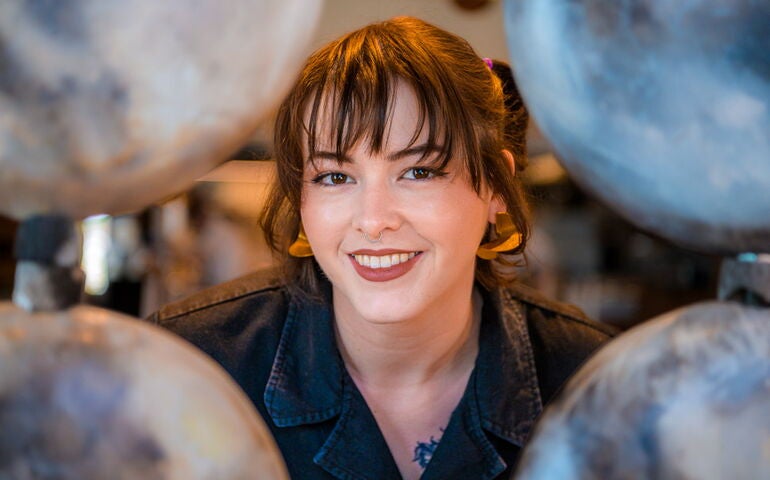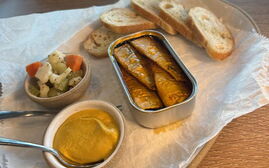On the Record: New executive chef at Portland restaurant Twelve is more mentor than manager
 Photo / Jim Neuger
Hannah Ryder, 27, was recently promoted to executive chef at Twelve, a high-end restaurant on Portland’s East End.
Photo / Jim Neuger
Hannah Ryder, 27, was recently promoted to executive chef at Twelve, a high-end restaurant on Portland’s East End.
Hannah Ryder was recently promoted to executive chef at Twelve, a high-end restaurant on Portland’s East End owned by the Prentice Hospitality Group. The 27-year-old, who grew up in Cumberland and has worked at the Prentice-owned Evo and Chebeague Island Inn, was part of the team that opened Twelve in July 2022. We sat down with her in the enclosed waterfront patio one sunny April morning as chefs were prepping that evening’s dinner.
Mainebiz: What’s a typical day like for you?
Hannah Ryder: I usually come in around 11 in the morning, and I’ll stay until close. I find myself less picking up a knife and actually cooking, and more kind of directing – a lot of overseeing of new projects. We have a pretty young kitchen, so a lot of my job is training, but not just training how to do a task. It’s more big picture – this is how you hold yourself, conduct yourself, approach a recipe as a young cook. It’s more of a mentorship than a management role.
MB: How did you get into this line of work?
HR: I always knew it’s what I wanted to do. My parents both went to Johnson & Wales [University] for culinary studies — it’s where they met. My dad’s out of the industry now, but my mom works for Sodexo in the dining services at the Maine College of Art and Design. When I was young, she would bring me into work and I would help set up the salad bar, and it felt exciting to me.
MB: And when did you start cooking?
HR: My first kitchen job was at the Muddy Rudder [a former Yarmouth restaurant recently sold at auction]. I was 15 working in the kitchen, at the salad station. I worked there through high school, and had another job at a café in Cumberland that no longer exists — I did a work-study there my senior year because I wanted to get a lot of experience. I was 18 when I went to the CIA [Culinary Institute of America], right out of high school.
MB: If you couldn’t do this, what could you imagine yourself doing?
HR: Floral design — something creative, and I still find ways to do that here.
MB: In coming up with dishes, how do you balance innovation with consistency?
HR: We find a lot of inspiration in what we’re able to get locally, which is obviously tough in the winter months. I find a lot of creativity coming from that inspiration, especially this time of year — knowing that we’re about to get peas and radishes and things we haven’t seen in a long time. That feels reinvigorating.
MB: With prices going up for everybody, have you had to be nimble and shift suppliers?
HR: That has been an added stress. We do an inventory every four weeks, and I find myself going back and checking invoices to see how prices are changing and from different purveyors. It has been something that has occupied the forefront of my mind for the last six months. I was just recently promoted, so there’s that added pressure of keeping the ship right. But we have tried to use more inexpensive proteins that we typically wouldn’t use, but still making them feel elevated, elegant and treated the same way that we would treat something that’s $50 a pound.
MB: Can you give an example?
HR: Salmon is a more price-friendly option for us than halibut, which isn’t in season. Come May, when halibut is in season, of course we’re going to eat the costs and have it on our menu, but we’re not going to have it on just to have it on. The salmon dish on the menu right now is one of my favorites, so finding ways to elevate these things that we’re used to.
MB: What’s your advice to someone thinking about entering the culinary industry today?
HR: Getting your foot in the door is the biggest thing. And then as you start learning of new places, that you could want to work, rarely is it ever unreachable. I always thought that before I went to Aquavit or Café Boulud [in New York City] that it would not be possible for me to do that. The hunger to learn is the most important thing.











0 Comments